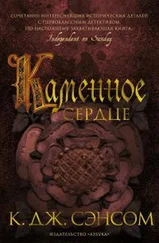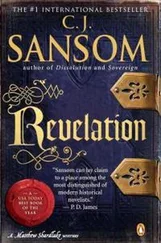‘She said her name was Mistress Edith Boleyn, and that until the death of her husband last November she had been mistress of a goodly farm near Blickling, fifteen miles north of Norwich. That’s where Anne Boleyn’s family came from, though there are other Boleyns scattered around Norfolk. I asked for details about the farm and she said it was a large one, but the lease ended with her husband’s death and the lord of the manor would not renew it. He was turning his lands over to sheep. She was given three months to quit.’ He smiled sardonically. ‘Just the sort of thing your friends the Commonwealth men rail against, though it can happen to wealthy tenants as well as poor ones.’
‘Did she not have children, relatives?’
‘She said she had no children and both her parents were dead.’ A flicker of compassion crossed his heavy features. The plight of Edith Boleyn had evidently moved Parry, hard man of affairs though he was. ‘If I had known then –’ he said, quietly, then lapsed into uncharacteristic silence.
‘Did she say exactly how her late husband was related to the Lady Elizabeth?’ I asked.
Parry nodded. ‘She said he shared a common great-great-grandfather with Anne Boleyn.’
In my work I dealt often with matters of family descent, and made a quick calculation. ‘Making him third cousin once removed to Elizabeth.’
‘She had the family tree off pat. Wrote it down for me on a sheet of paper, all the way back to Geoffrey Boleyn, who came to London in the 1420s and became Lord Mayor. It was obviously painful for her to write, her fingers were bent and the knuckles of both hands badly swollen. She wrote in a good hand, though, which showed she was educated. I noticed she wore no wedding ring, and asked her about that. She said that when her fingers became swollen she had to have it cut off as it was pressing painfully into the skin. I was starting to believe her.’ Parry raised his bushy eyebrows again, and his voice hardened. ‘But then I asked for some more details, and her story began to fall apart.’
‘How?’
‘When I asked the name of the lord of the manor who had dispossessed her, the details of the tenancy, the name of the nearest town and the local families, she came out with a list of sheer fictions. She had rehearsed them well but had not taken into account that my past experiences have given me, with lawyer Copuldyke’s help, a detailed knowledge of Norfolk geography. When I challenged her she began to stammer and trip over her words. Mistress Blanche and I were both looking at her hard by then, and she saw she was in trouble. In the end she blurted out that her husband was truly kin, and she asked for no more than the humblest place in the household – a maid, a cook’s assistant, anything the Lady Elizabeth could give her. She was red in the face by now. I noticed then that her fingers were calloused as well as swollen. This woman had known hard manual labour.’ Parry shrugged his broad shoulders. ‘Well, after her lies about where she came from, there was nothing to do but turn her out. I thought, whoever she is, she came of gentle stock once, and had fallen on bad times, but that can happen to the best of people these days and does not justify telling such lies. I told her to leave.’
‘And did she?’
‘I expected her to burst out crying and weeping but she didn’t; she only slumped in her chair. I asked Mistress Blanche to show her out. As she led her to the door I put my hand to my purse – I was going to give her a few coins – but Mistress Blanche shook her head. She was right, we cannot encourage liars. The woman left the house as she came, by the back door.’ He paused, then looked at me. ‘Yet, as I was to discover, though Edith Boleyn was a liar where her personal circumstances were concerned, what she said about being related by marriage to the Lady Elizabeth was quite true. And that is why, Master Shardlake, we are in trouble.’
‘Trouble made by her?’ I asked.
Parry gave a humourless laugh. ‘Only if you consider getting yourself murdered in the foulest way imaginable to be making trouble.’
I said quietly, ‘So it is a murder you wish me to investigate?’
‘It is, I fear.’ He looked me in the eye.
People in high places had made that request of me before. It usually provoked a clutch of anxiety at my heart. But in Parry’s office in Hatfield Palace I felt, unexpectedly, a quickening of excitement. I glanced sideways at Nicholas. His face was alive with interest too.
‘What happened to her?’ I asked.
Parry opened a drawer in his desk, took out a folder and removed a sheet of paper. It was a deposition, a witness statement for a court case. He looked at it. ‘I told you that Edith Boleyn – and that was her real name – came here on the fourth of May. Eleven days later, early on the morning of the fifteenth, a shepherd named Adrian Kempsley left his cottage in the parish of Brikewell, south of Norwich, to go and tend his master’s sheep. The master’s name is Leonard Witherington, and he is one of those who has been building up flocks of sheep on his lands, and, yes, encroaching on common land. He is unpopular with his tenantry, and with his neighbour, another landlord.’
I nodded. ‘As I said, if they are not quarrelling with their tenants, the Norfolk gentlemen fight with each other.’
Parry continued. ‘Between them, Witherington and his neighbour had purchased a large parcel of monastic land when the abbeys went down ten years ago. Apparently, the old monastery deeds were unclear about the boundary and Master Witherington recently claimed a good portion of his neighbour’s land.’ He raised his eyebrows. ‘The neighbour’s name is Master John Boleyn, he is Edith’s husband, and he is not, as she told us, dead. Though he may be, within the month, dangling on the Norwich gallows.’
Nicholas’s eyes widened. ‘She had a husband living! Then why come here?’
Parry raised a hand. ‘Wait, young man. To continue, according to Adrian Kempsley, whose deposition this is, Witherington’s sheep were kept on a large meadow, which slopes down to a stream, which forms the boundary between Witherington’s land and that of John Boleyn, though as I said, that boundary is disputed.’
I said, ‘There have been many such cases since the monastic lands were sold off, title documents often centuries old and plans faded, or unclear.’
‘Indeed,’ Parry agreed. ‘There has been much rain this spring, as you know, and the stream was full, a good deal of mud around it. Kempsley saw something white sticking out of the stream, and in the early light thought a sheep had got itself trapped. When he came closer, though, he got the shock of his life.’ He paused. ‘I warn you, this next part is, as I said earlier, depraved and revolting. It was no sheep that Kempsley saw but, sticking up from the water, the naked body of Edith Boleyn. She had been shoved into the stream head first, her head and the upper half of her body buried in the water and the mud beneath. Her lower half stuck up in the air, her legs pulled apart so that her private parts were displayed to the heavens.’
There was a moment’s silence. ‘Someone must have hated her very much to do that,’ I said quietly. ‘What was the cause of death?’
‘No question about that,’ Parry answered. ‘She had been struck on the head with something very heavy. Kempsley says the top of her head fell to pieces when they pulled the body out. It must have been placed in the stream the night before. And yet Edith Boleyn had, according to law, already been dead for two years.’
Nicholas had been taking notes, a paper on a wooden board on his knees, but now his quill skittered across the page, dropping blots. ‘ What? ’
Parry laughed bleakly. ‘That was my reaction when lawyer Copuldyke told me.’ He drew a second deposition from the folder. ‘According to John Boleyn, his wife Edith, mother of his two sons, simply vanished one day in 1540, nine years ago. He says they had never got on, but her disappearance was sudden and unexpected. She vanished one winter day with nothing but the clothes she stood up in. John Boleyn enquired of her family – and she does have family, despite what she told us – her servants and the neighbours, but nobody had seen her or could explain her disappearance. She was never seen again. Two years ago, seven years having passed, Master Boleyn applied to the coroner to have Edith declared legally dead. An order was granted, and last year he married his current wife – with whom he had already been living for some years, somewhat to the scandal of the community.’
Читать дальше
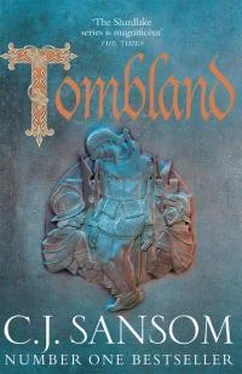
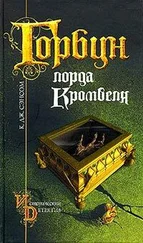
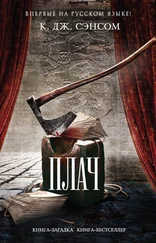

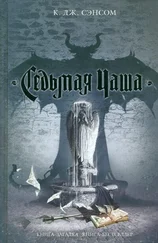
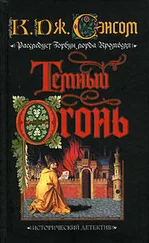
![К Сэнсом - Стенание [другой перевод]](/books/432043/k-sensom-stenanie-drugoj-perevod-thumb.webp)
